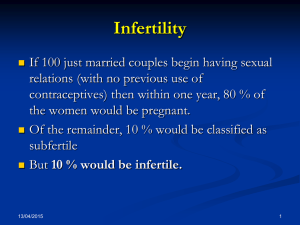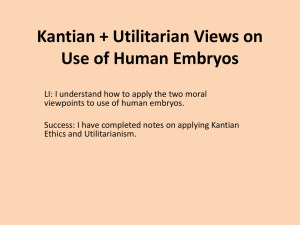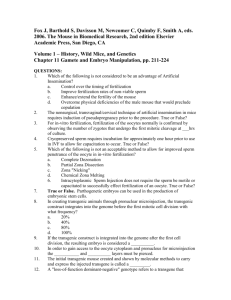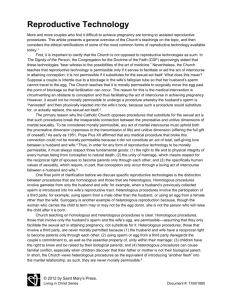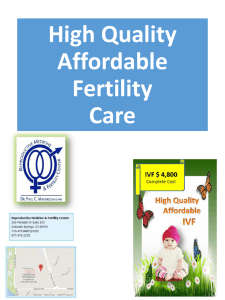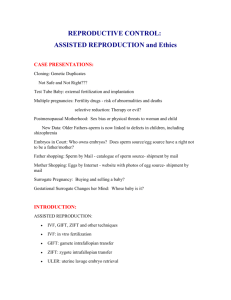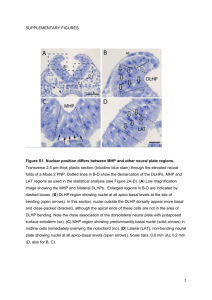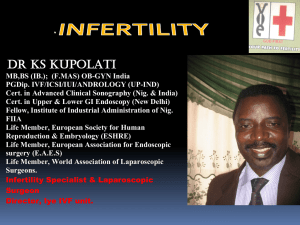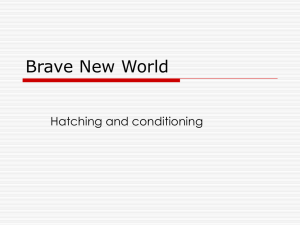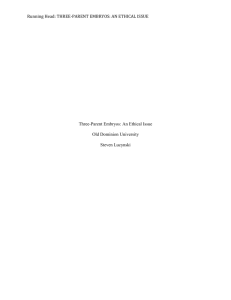the technique of ivf
advertisement
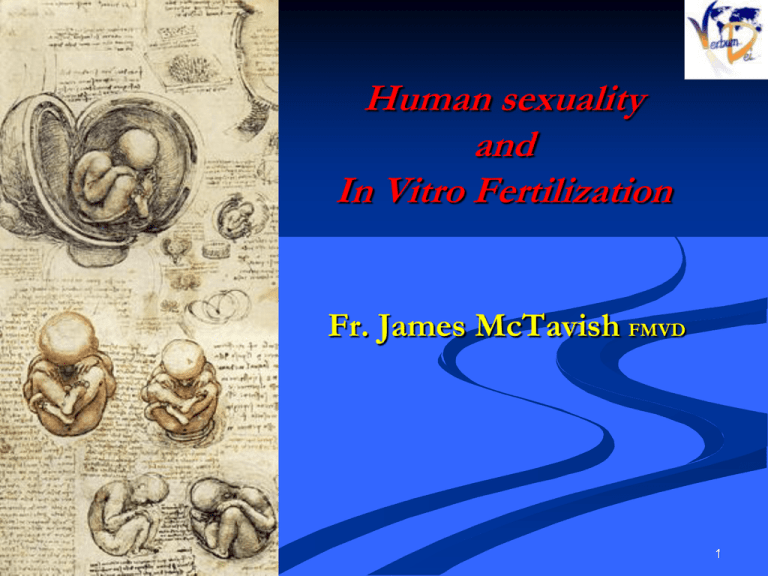
Human sexuality and In Vitro Fertilization Fr. James McTavish FMVD 13/04/2015 1 ESSENTIALS Union Procreation “The two shall become one” “Go forth and multiply” Human Divine Physical nature Vocation, mission, eternity 13/04/2015 2 Infertility If 100 just married couples begin having sexual relations (with no previous use of contraceptives) then within one year, 80 % of the women would be pregnant. Of the remainder, 10 % would be classified as subfertile But 10 % would be infertile. 13/04/2015 3 Problems in the male account for 25% of cases of infertility In the female 40 % And combined male/female problems in the remaining 35%. 13/04/2015 4 Infertility is a growing problem. Some probable causes include; Delayed marriages and later childbearing Sexually transmitted diseases Pollution Diet Lack of exercise Previous contraceptive use leading to sterility Sterility from previous abortion Falling sperm count in males (medicines, alcohol etc) 13/04/2015 5 I.V.F. In Vitro Fertilization “Test tube babies” 13/04/2015 6 Louise Brown, 1978 7 Dr Edwards, IVF pioneer “I wanted to find out exactly who was in charge, whether it was God Himself or whether it was scientists in the laboratory.“ And what did he conclude? "It was us," he smiles triumphantly. 8 Today there are more than 3 million IVF babies 13/04/2015 9 Success rate of IVF? Success rates vary and are often exaggerated To attract more clients Probably around 20-25 % successful 13/04/2015 10 How much does it cost? Average cost of total treatment $10,000 - $25, 000 (American dollars) Industry generates $ 2 billion per year. 13/04/2015 11 THE TECHNIQUE OF IVF 1. 2. 3. 4. There are generally four major steps in the process of IVF: Collect eggs from the woman Obtain sperm from the man In the laboratory place eggs and sperm together to allow for fertilization, to create embryos. (ICSI-Intra-cytoplasmic sperm injection since 1990’s.) Transfer embryos into uterus of woman 13/04/2015 12 THE TECHNIQUE OF IVF 4 2 1 3 13/04/2015 13 THE MORAL ISSUES The spread of technologies of intervention in the processes of human procreation raises very serious moral problems (Donum Vitae, Part III). 13/04/2015 14 1. Collect eggs from the woman The woman is given drugs to hyper-ovulate (produce many eggs). The drugs can cause side effects such as abdominal pain, nausea etc. 13/04/2015 15 2. Obtain sperm from the man Obtaining sperm by masturbation may be morally objectionable Sometimes donor sperm may be used 13/04/2015 16 3. In the laboratory place eggs and sperm together to allow for fertilization, to create embryos Embryos are created in the laboratory (the test tube) thus human fertilization occurs apart from sexual intercourse and outside the human body. The unitive-procreative dimension of the conjugal act is lost. 13/04/2015 17 The destruction of embryos Many embryos created. Healthy ones kept but defective embryos are destroyed. Healthy embryos can be transferred to woman or they can be frozen for use at later date. Sometimes they are experimented on. “The human being is to be respected and treated as a person from the moment of conception” Pope John Paul II 13/04/2015r 18 The problem of frozen embryos In USA there are >400,000 frozen embryonic persons, a kind of “hell of ice”. In thawing them 50 % will die. Worldwide there are up to 1 million frozen embryos What to do with the frozen embryos? 13/04/2015 19 4. Transfer embryos into uterus of woman Many embryos implanted in mother’s womb (usually 2-4) to increase chance of pregnancy. Should too large a number of embryos start to grow, the ‘excess’ embryos are usually aborted (called “pregnancy reduction”). 13/04/2015 20 CONCLUSIONS Why the Church says ‘NO’ to IVF 1. Separation of the unitive-procreative dimension of the conjugal act 13/04/2015 21 The inseparable connection: union and procreation The Church's teaching on marriage and human procreation affirms the inseparable connection, willed by God and unable to be broken by man on his own initiative, between the two meanings of the conjugal act: the unitive meaning and the procreative meaning. By safeguarding both these essential aspects, the unitive and the procreative, the conjugal act preserves in its fullness the sense of true mutual love and its ordination toward man's exalted vocation to parenthood see Humanae Vitae 12 13/04/2015 22 CONCLUSIONS 2. Massive destruction of human life Currently the number of embryos sacrificed, even in the most technically advanced centers of artificial fertilization, hovers above 80%. (Footnote 27, Dignitas Personae) 13/04/2015 23 CONCLUSIONS 3. The child must be a gift not a product The child has the right ‘to be the fruit of the specific act of the conjugal love of his parents’. CCC 2378 13/04/2015 24 The child becomes a manufacturing product and not a gift A child …”cannot be desired or conceived as the product of an intervention of medical or biological techniques; that would be equivalent to reducing him to an object of scientific technology.“ Donum Vitae II, B,4,c 13/04/2015 ‘Product’ 25 Genetic testing A kind of quality control selection Where is it going? To create the perfect baby – disease free, blond hair, blue eyed, good footie player … See ‘Gattaca’ video clip 13/04/2015 26 Pastoral support “The community of believers is called to shed light upon and support the suffering of infertile couples…Spouses are called to find in it an opportunity for sharing in a particular way in the Lord's Cross, the source of spiritual fruitfulness…Physical sterility can be the occasion for other important services to the life of the human person, for example, adoption, various forms of educational work, and assistance to other families and to poor or handicapped children.” (Cf. DV, II, B, 8,d) 13/04/2015 27 “Although the manner in which human conception is achieved with IVF and ET cannot be approved, every child which comes into the world must in any case be accepted as a living gift of the divine Goodness and must be brought up with love.” Donum Vitae II, B5 13/04/2015 28 “You formed my inmost being; you knit me in my mother's womb. Fearfully and wonderfully made!” Psalm 139 13/04/2015 29 The Church is announcing a big ‘YES’ to life! The Church’s mission to protect the poor…”implies courageous opposition to all those practices which result in grave and unjust discrimination against unborn human beings, who have the dignity of a person, created like others in the image of God. Behind every “no” in the difficult task of discerning between good and evil, there shines a great “yes” to the recognition of the dignity and inalienable value of every single and unique human being called into existence.” (Conclusions, D.Pae) 13/04/2015 30 Thank you! 13/04/2015 31 Questions 1. 2. 3. If you are asked as a Catholic ‘on what basis does the Church say no to IVF?’ can you now explain it? How do you understand the inseparability of the unitive and procreative dimensions of the conjugal act? What is your ethical opinion about embryo destruction and freezing? 13/04/2015 32
